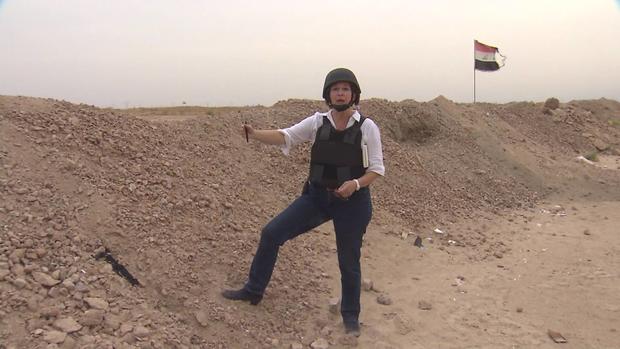Elizabeth Palmer answers your questions on ISIS and Iraq
BAGHDAD, Iraq - While covering the Iraqi response to ISIS militants, CBS Evening News foreign correspondent Elizabeth Palmer answered viewer's questions on the CBS Evening News with Scott Pelley Facebook page from Baghdad.
Question: Is there a way to measure how much the U.S. airstrikes are actually helping in the fight against ISIS?
Elizabeth Palmer: There is no direct way.We have seen a direct correlation in Kobani over the past week between the increase in airstrikes and ISIS retreat. We also visited an area south of Baghdad where the Iraqi forces say that two airstrikes flattened very important ISIS sniper positions...and that tipped the balance. Once the snipers had been killed, the Iraqi troops got the rest of the ISIS fighters on the run. But it's piecemeal evidence. And we know that US airstrikes use expensive high tech weapons against preemptive targets - either small groups of fighters, or for example, a few ISIS armed vehicles. It's a costly way to fight what is really an insurgent war.
Question: I teach media law to college journalism students with an emphasis on press freedoms. Can you spend a moment talking about the impact the turmoil in Iraq is having on press freedoms there?
Elizabeth Palmer: There was no media freedom in Iraq even before ISIS. It takes a long time to build a tradition of free media under dictatorship. Any reporting critical of the government is ruthlessly suppressed. That's certainly happening now in Iraq because the army has suffered so many humiliating defeats.
Question: Showing where your correspondent is at a battle zone exposes her to terrorists who will put a bounty on her and behead her publicly. I don't know why Americans are so so dumb.
Elizabeth Palmer: I'm not sure who you are calling dumb. Not me, surely. We know we are taking risks when we come into these kinds of battle zones - but we think being in Baghdad is a manageable risk. We think it is important for honest public debate and hard information; that there are journalists here bearing witness, and reporting. Of course, the very first job requirement is to stay alive!
Question: Why does the President call it ISIL and you guys...and everyone else call it ISIS? What's HIS spin on the acronym?
Elizabeth Palmer: ISIS and ISIL mean the same thing. The "S" is for Sham - the old name for the Syrian region. "L" is for Levant...a less old name for the region."ISIS" surfaced first as an acronym among the fighters and politicians of the area and we started using it. Later, others began to use ISIL - I suppose because "Sham" is such an odd word in English.No spin...just the way it evolved. The Arabs have a totally different word for ISIS/L -- Dayesh.
Question: How did ISIS prepared themselves in a short time (Gen. Dempsey said Pentagon was following them since February) And how did they get U.S. weapons ? And while there are hundreds of agents in that area, how did they work under the radar and become so strong?
Elizabeth Palmer: We were here last January and reported that ISIS had taken Fallujah, which is just west of Baghdad. At that time we knew they were in control in the north too - running protection rackets, etc. But they transformed themselves from thugs into the current terrorist organization over the year - mostly in Syria. They got their American weapons from the Iraqi bases they have conquered and looted. Those weapons were given to the Iraqis by the U.S. when it equipped Iraq's armed forces.
Question: What's the most unique or surprising thing you've encountered while in the field?
Elizabeth Palmer: Just this very week we were sent out in the field with a very senior Iraqi division commander just south of Baghdad, and he walked up to us and said in perfect English, "I was the first Iraqi cadet to graduate from the U.S. Army War College Pennsylvania." He clearly learned a huge amount from that experience.
Tonight, on the CBS Evening News with Scott Pelley Elizabeth Palmer reports on the training of Iraqi security forces.

